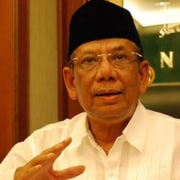
Nahdlatul Ulama plans to hold its five yearly national congress later this month. Photo by Mufid Majnun on Unsplash.
Nahdlatul Ulama, Indonesia’s largest Islamic organisation, plans to hold its long-postponed National Congress (muktamar) later this month. The muktamar is held once every five years, and is the organisation’s most important leadership meeting. Its primary agenda is to elect the organisation’s next chairman, who will then select members of NU’s leadership board (PBNU). Together, the chairman and PBNU members set the organisation’s national agenda and priorities for the next five years.
As the congress approaches, competition between the two leading contenders to become the next NU chairman, Said Aqil Siradj, the organisation’s incumbent chairman, who has led NU since 2010, and Yahya Cholil Staquf, the general secretary of the organisation, has become increasingly heated. Yahya is widely known as the unofficial NU “foreign minister” for his efforts to promote NU’s moderate Islamic ideology in Western countries.
Yahya is also an elder brother of Yaqut Cholil Qoumas, the current minister of religious affairs and a former chair of Ansor, NU’s youth organisation. Yaqut was promoted to the ministry as part of President Joko “Jokowi” Widodo’s efforts to consolidate his support among the 90 million traditionalist Muslims that NU has often claimed to represent.
During his decade-long tenure in the organisation, Said Aqil was credited for institutionalising Islam Nusantara as NU’s official ideology in 2015. Islam Nusantara formalises the moderate Islamic customs, traditions, and principles advocated by the late Abdurrahman Wahid, NU’s long-term leader, who had promoted them within the organisation when he first became NU chairman in 1984.
Said Aqil is also credited with bringing NU into a close alliance with the regime of Jokowi – so close, that by the 2019 Indonesian election, Jokowi considered NU to be his main Islamic ally. In fact, Jokowi would likely not have prevailed in the tough re-election campaign against his rival Prabowo Subianto had it not been for the strong endorsement of Said Aqil, his recruitment of former NU spiritual leader Ma’ruf Amin as vice president, and the backing of other senior NU clerics, which led to his decisive victory within NU-dominated East Java and Central Java provinces.
However, this close alliance is increasingly facing severe criticism. Many within NU are concerned that its close alignment with Jokowi is violating the principle of political neutrality first promoted by Wahid during the organisation’s 1984 muktamar in Situbondo, East Java. Critics complain that the alliance has limited NU’s ability to criticise the regime whenever it pursues policies that are not well-received by NU’s rank-and-file members.
For example, NU activists have criticised Said Aqil for not condemning the regime’s 2019 revision of the law on the Corruption Eradication Commission (KPK) that seriously weakened its authority, and the more recent sackings of nearly 60 KPK investigators.
Yahya has made the close alignment between NU and the Jokowi regime a central issue of his campaign for the chairmanship, promising that he will restore the 1984 national congress’ decision declaring NU a politically neutral organisation.
Despite such promises, there are already indications that the NU leadership race is becoming highly politicised. Both Said Aqil and Yahya have received implicit endorsements from high-level politicians affiliated with the National Awakening Party (PKB) – NU’s semi-official political party, which is also a member of the president’s coalition.
Specifically, Said Aqil is considered to have the support of PKB chairman Muhaimin Iskandar, a consistent patron of Said Aqil since he first assumed the NU chairmanship in 2010. Meanwhile, Yahya has his brother’s support, and Yaqut is thought to have mobilised Ministry of Religious Affairs officials to aid the former’s candidacy.
Said Aqil’s supporters have accused Yahya of collaborating with his brother Yaqut to use the ministry’s authority to influence prospective muktamar participants to support Yahya’s candidacy. This, they say, is a violation of Indonesia’s civil service law that prohibits civil servants from engaging in political activism. Said Aqil has even issued a statement saying that civil servants ought to be neutral and should not intervene in the NU chairmanship race.
The increasing competition between the two camps can also be seen in their manoeuvres in response to the Indonesian government’s request for NU to change the date of the muktamar. The original date fell during a planned lockdown announced by the government to prevent the spread of Covid-19 during Christmas and New Year holidays.
Yahya’s supporters argued the muktamar should therefore be brought forward to the week of 17 December. Miftachul Akhyar, NU’s Rais Aam or supreme leader, issued a letter stating the muktamar should be held on this date. But Said Aqil’s supporters said that they did not consider the letter legally binding. They preferred postponing the national congress until the last week of January 2022, presumably to allow more time for his campaign team to lobby prospective muktamar delegates.
Regardless of who is chosen as the next NU chairman, the most important issues for NU activists to consider during the congress are: 1) how do they continue to promote NU’s moderate Islamic vision in light of increasing religious conservatism in contemporary Indonesia; and 2) how do they balance NU’s needs to support the Jokowi regime’s promotion of religious moderation, while maintaining its political neutrality and willingness to criticise Jokowi’s economic policies that negatively affect poor workers, farmers, and other economically marginalised groups.
Lastly, public officials – including those affiliated with NU and PKB – should retain their neutrality. The chairmanship race should be decided by NU members and activists themselves. Any political intervention could further compromise NU’s reputation as one of Indonesia’s leading civil society organisations, long known for its support for democracy and religious pluralism.











